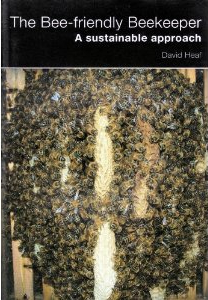
The Bee-friendly Beekeeper
 As regular readers know, I've
been pondering alternative beekeeping methods all winter. Both
of our hives (semi-traditional Langstroth) died last fall, so we're buying two
packages of chemical-free
bees to start over this spring. One package will go into a top bar hive courtesy of Everett, but I
haven't quite decided whether the other colony will go back into our
Langstroth hives (managed
in Michael Bush's style) or whether they'll go into
a Warre hive.
As regular readers know, I've
been pondering alternative beekeeping methods all winter. Both
of our hives (semi-traditional Langstroth) died last fall, so we're buying two
packages of chemical-free
bees to start over this spring. One package will go into a top bar hive courtesy of Everett, but I
haven't quite decided whether the other colony will go back into our
Langstroth hives (managed
in Michael Bush's style) or whether they'll go into
a Warre hive.
When I explained the differences
between Warre and top bar hives before, I said that the book
to read on Warre hives is Abbe Warre's Beekeeping
for All.
However, I ended up instead picking up a copy of David Heaf's The Bee-friendly Beekeeper. This modern book sums
up the experiments and innovations that have accumulated since the
Warre hive hit the English-speaking world in 2006. It has lots of
pretty pictures to make the text more understandable and is definitely
worth hunting down (even though it's expensive in the U.S. since the
book is British). The author is a bit preachy about
sustainability of materials and the book is short (referring you back
to Beekeeping
for All for more
information), but I like the way Heaf has clearly delved into the
scientific literature to find real facts about natural beekeeping.
Stay tuned for
information about the Warre hive all week in my lunchtime series.
Meanwhile, maybe you can help me decide whether it's crazy to try out
two new beekeeping methods at once, or whether it's an unparalleled
opportunity for a side by side comparison of horiztontal and vertical
top bar hives.
| This post is part of our Warre Hive lunchtime series.
Read all of the entries: |
Want more in-depth information? Browse through our books.
Or explore more posts by date or by subject.
About us: Anna Hess and Mark Hamilton spent over a decade living self-sufficiently in the mountains of Virginia before moving north to start over from scratch in the foothills of Ohio. They've experimented with permaculture, no-till gardening, trailersteading, home-based microbusinesses and much more, writing about their adventures in both blogs and books.
Want to be notified when new comments are posted on this page? Click on the RSS button after you add a comment to subscribe to the comment feed, or simply check the box beside "email replies to me" while writing your comment.

I can tell you from keeping multiple bee hives in the same area in the same types of hives, it's all about the queen. Good queen, good hive. Poor queen, DEAD hive.
--Mike
schomestead.com
I definitely agree with you that genetics are important. That's why we chose bees bred to live well without chemicals.
That said, I can't see how the way they're managed wouldn't also impact their lives. With our chickens, having a good breed makes them much more able to forage and live partially on wild food, but so does planning our pastures and coop appropriately.